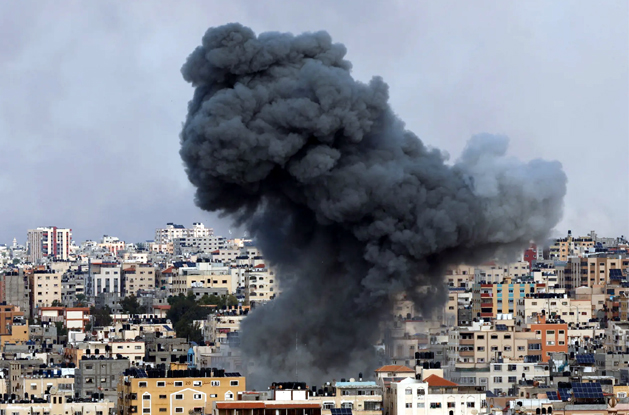Vijay Hashia
The Israeli-Palestinian conflict is a deeply rooted and highly contentious dispute over land between Israeli Jews and Palestinian Arabs. The conflict traces its origins back to the early 20th century when Jews, fleeing persecution in Europe, sought to establish a national homeland in what was then an Arab Muslim majority territory under Ottoman and later British rule. Palestinians vociferously argue that the region had been under Ottoman rule until WW I and that Jews were thrust upon Muslim lands by an unfair Balfour Declaration of 1917. The United Nations’ attempt to divide the land between Jews and Arabs in 1947 failed, leading to several wars between Israel and neighboring Arab nations. The 1967 war, in particular, resulted in Israel gaining control of the West Bank and Gaza Strip, territories with large Palestinian populations.
The conflict revolves around four core issues: West Bank borders/settlements, Israeli security, Palestinian refugees, and Jerusalem. The peace process often referred to as the “Oslo Accords,” aimed at finding a resolution, operates on a “land for peace” framework. The mainstream solution is the “two-state solution,” which proposes an independent Israel and Palestine coexisting peacefully. However, obstacles such as West Bank settlements, political divisions among Palestinians (Fatah and Hamas), and mutual distrust hinder progress.
Jerusalem, a city sacred to both Judaism and Islam, remains a major point of contention. The status of Jerusalem and how it should be divided between Israelis and Palestinians is a fundamental issue in the conflict.
The Palestinian Liberation Organization (PLO) serves as the representative of the Palestinian people and governs the West Bank, while Hamas governs Gaza independently of the Palestinian Authority.
Hamas is designated as a terrorist organization by multiple countries, including the United States, Canada, the European Union, and Israel. It was founded in 1987 and has engaged in armed conflict with Israel, using tactics like suicide bombings and rocket attacks. While it won the majority of seats in the 2006 Palestinian Authority elections, it refused previous deals with Israel, leading to tensions with the Palestinian Authority and subsequent aid freezes by Western powers. Unity talks between Hamas and the PLO have faced numerous challenges, hindering a unified Palestinian authority.
Egypt’s 1978 peace treaty with Israel, backed by substantial American aid, restricts Egypt’s military presence in the Sinai Peninsula, allowing militant groups to thrive. Syria, aligned with Israel’s adversary Iran, seeks the return of the Golan Heights, seized by Israel in 1967. Lebanon houses Hezbollah, an anti-Israeli group funded by Iran, shaping Lebanese politics.
Jordan, Israel’s eastern neighbour, hosts a large Palestinian refugee population and has a peace treaty with Israel. Iran vehemently opposes Israel, supporting anti-Israel factions like Hezbollah and Hamas. Turkey’s leadership champions the Palestinian cause, while Saudi Arabia, despite not recognizing Israel, collaborates due to shared concerns about Iran.
The nature of US-Israel friendship remains contentious, with varying reasons cited for the robust alliance. While substantial American aid and diplomatic support indicate a strong bond, reasons behind it differ among experts. Potential factors include public support for Israel, influence from the pro-Israel lobby, and shared democratic values.
In the early years, the relationship was less intimate, marked by President Eisenhower’s hostility during the 1956 Suez War. Despite the closeness, occasional tensions surfaced, exemplified by disagreements between leaders like Obama and Netanyahu, notably on settlements and Iran. The Trump era saw a warmer rapport, culminating in recognizing Jerusalem as Israel’s capital.
Arab nations share strategic alignment regarding Gaza; most are hostile to Hamas due to its ties to the Muslim brotherhood. Many Arab states, fearing Iranian influence, have cracked down on both the Muslim brotherhood and its proxy, Hamas. Arab governments might play a role in shaping a political resolution in Gaza
that advances Palestinian goals while countering Islamist movements and Iranian proxies.
Non-Muslim nations universally acknowledge Israel’s legitimacy and uphold diplomatic ties; yet widespread criticism persists over Israel’s treatment of Palestinians and its continued occupation of the West Bank. Around 83% of global countries, including those not Arab or Muslim-majority, formally recognize Israel. Despite diplomatic relations, global sentiment remains divided, with concerns centered on Palestinian rights and the West Bank situation.
While India’s stand and support for a sovereign, independent, united and viable Palestine co- existing peacefully with Israel is steadfast, which is evident on the recent trip of PM Modi while hosting the Palestinian President Mahmoud Abbas just weeks before his Israel trip but at the same time condemns the terrorism of Hamas taking heavy toll of innocent lives on 07th Oct.
The current situation is complex. Palestinian President Mahmoud Abbas distrusts the Israeli government, especially due to settlement expansion in the West Bank, which Palestinians view as obstacles to the creation of a viable Palestinian state. Israeli Prime Minister Benjamin Netanyahu, while publicly expressing support for a two-state solution under pressure, faced criticism for his stance, and Israel remains skeptical due to concerns about security and the Hamas-Fatah split, making a lasting peace agreement elusive.
If peace fails to return, there are concerns that Israel, the West Bank, and potentially Gaza could effectively become a single state. This scenario poses significant challenges for both Israel and Palestine. Additionally, the ongoing war, which is delayed due to negotiations involving 222 Israeli hostages, might escalate into a deadly conflict against Hamas.


